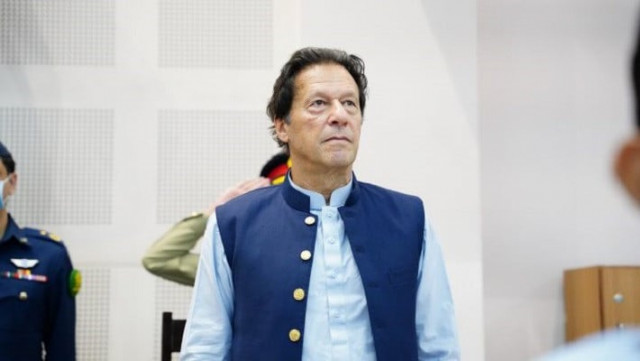PM okays lifting of 32% flour subsidy
Finance minister says Kamyab Pakistan Program to be launched this month

Prime Minister Imran Khan has allowed the withdrawal of the subsidy on wheat flour for urban consumers and agreed to increase the release price of the commodity to mills by over 32% to Rs1,950 per 40kg due to limited fiscal space.
“The wheat release price has been fixed at Rs1,950 per 40kg,” Finance Minister Shaukat Tarin said on Tuesday while addressing a news conference that was held to explain the reasons behind the soaring inflation and public debt.
The minister added that the release rate of Rs1,950 per 40kg would “help reduce the wheat flour price”.
The wheat release price in the last season was Rs1,475 per 40kg. The provincial governments issue wheat to the flour mills from its stocks at the release price.
The provincial governments supply wheat to the mills at controlled prices to ensure availability of the flour at relatively reasonable rates.
Jamshed Iqbal Cheema, special assistant to the PM on food security, said the decision to fix wheat release price at Rs1,950 per 40kg had been made in a meeting chaired by prime minister last week. It was also attended by provincial governments.
At the price of Rs1,475 per 40kg, the four provincial governments had provided roughly 6.2 million metric tons of wheat for grinding to the mills that cost them over Rs100 billion in subsidies, according to the national food security and research ministry.
“Keeping the wheat release price at Rs1,475 per 40kg meant providing a ‘massive subsidy’ that was not affordable,” Tarin told a reporter.
“At Rs1,950, the provincial governments would still provide nearly Rs100 per 40 kg in subsidy, he added.
The increase in the wheat release price suggests that the government itself is fuelling inflation at a time when the prices of the commodity are on the rise in the international market.
Pakistan has decided to import four million tons of wheat, according to independent analysts.
It received $369.5 per metric tons bid for the tender opened that last week at the Karachi port – translating into roughly Rs2,460 per 40kg.
Read Way cleared for Tarin to become senator
The Pakistan Bureau of Statistics on Friday reported the average price of a 20kg wheat flour bag at Rs1,220, showing an increase of 5% within one week and 20% within a year.
The finance minister claimed that the provinces were neither providing adequate support to control the prices, nor the prime minister could manage rates from their offices.
“The previous government kept the wheat support price unchanged at Rs1,250 per 40kg and as a result there was no increase in yield of the crop during the past five years,” the finance minister said. He added that the PTI government had increased the support price to Rs1,800.
Tarin said from this month, the government was going to give targeted cash subsidies on wheat flour, sugar, ghee and pulses to up to 40% of the population.
“The government also intends to increase the income and affordability of people to buy commodities.”
The finance minister also said the funds to give targeted subsidies would be provided by the Benazir Income Support Programme (BISP), which has sufficient allocations for this fiscal year.
A BISP official said that there was a proposal to give additional cash grant to roughly five million people to offset the impact of high food prices.
Tarin said Pakistan was linked to the international market as it had to import wheat, sugar and pulses. “We also have to see whether the exports of some perishable goods should be allowed that are becoming expensive for the country,” he added.
He again repeated the argument of exorbitant profit rates being charged by the middleman, saying the scientific study of profit margins would be conducted in 10 days.
“We want to stabilise prices but the income of the people will have to be increased.”
Tarin again blamed the International Monetary Fund (IMF) for the rising prices in the country.
“The PTI government in 2018 had to go to the IMF, which led to devaluation of rupee from Rs104 to Rs168 and an increase in the discount rate to 13.25%.”
These two factors, he claimed, increased the prices at one hand and on the other curtailed economic activity.
Read Tarin expresses satisfaction over PSX progress
The minister said the government had tried its best not to pass on the impact of the international prices to the people. He claimed that the prices of various commodities were still low in the country against those in the international and regional markets.
He said in Pakistan, the consumer price index (CPI)-based inflation stood at 4.8% in 2018, which this year would remain around 8%.
He added that food inflation in July 2020 was 15.1% in the urban areas of the country and 17.8% in rural ones.
“Now, it has reduced to 10.2% and 9.1% in urban and rural areas respectively.”
The minister said Kamyab Pakistan Programme would also be launched this month with a bottom-up approach to help low-income people.
To a question, Tarin said the loan size had been reduced to even less than half of originally planned Rs315 billion for this year. The amount of subsidies have also been reduced from Rs21 billion to Rs10 to Rs12 billion for one year.
The minister said the public debt had increased in the past three years because of low economic growth, the IMF programme policies and the Covid-19 pandemic.
In terms of size of the economy, it was around 83.5% and on the declining trend, said Tarin, adding that the public debt was recorded at 72.5% of the GDP during the fiscal year 2018.
The minister said currently, the country’s debt stood at Rs39.9 trillion against Rs25 trillion in 2018.
He explained that the increase in interest rates to 13.25% also pushed the public debt high.
“This increased debt servicing form Rs1.5 trillion to Rs2.9 trillion within a year, increasing the public debt.”
The minister said some of the debt was used to build foreign exchange reserves. “Nearly $4 billion to $5 billion foreign exchange reserves were increased through loans.”



















COMMENTS
Comments are moderated and generally will be posted if they are on-topic and not abusive.
For more information, please see our Comments FAQ